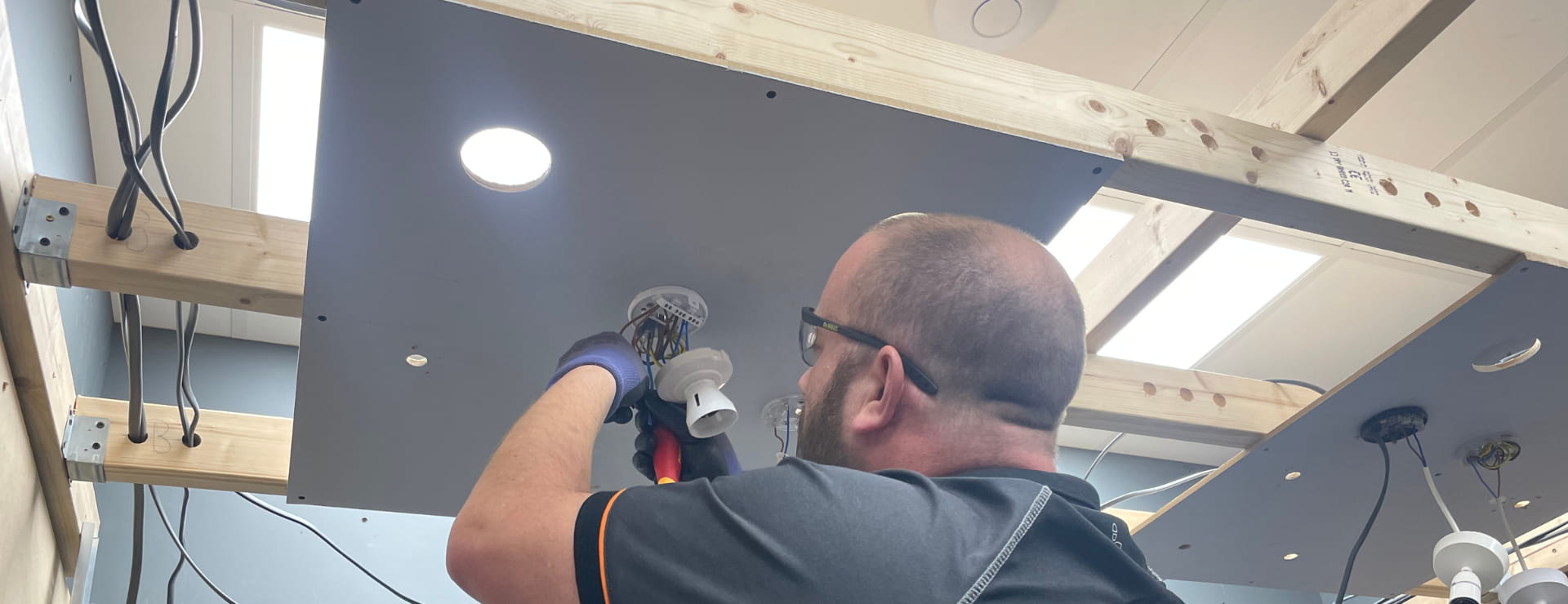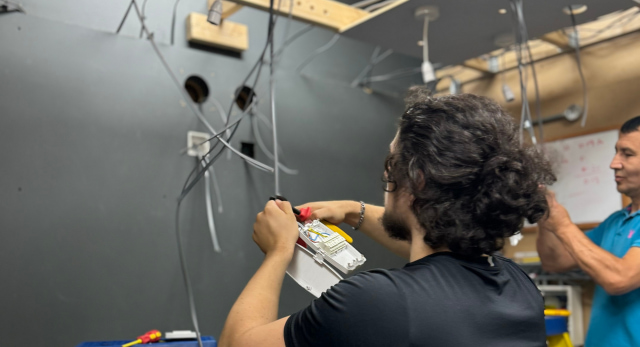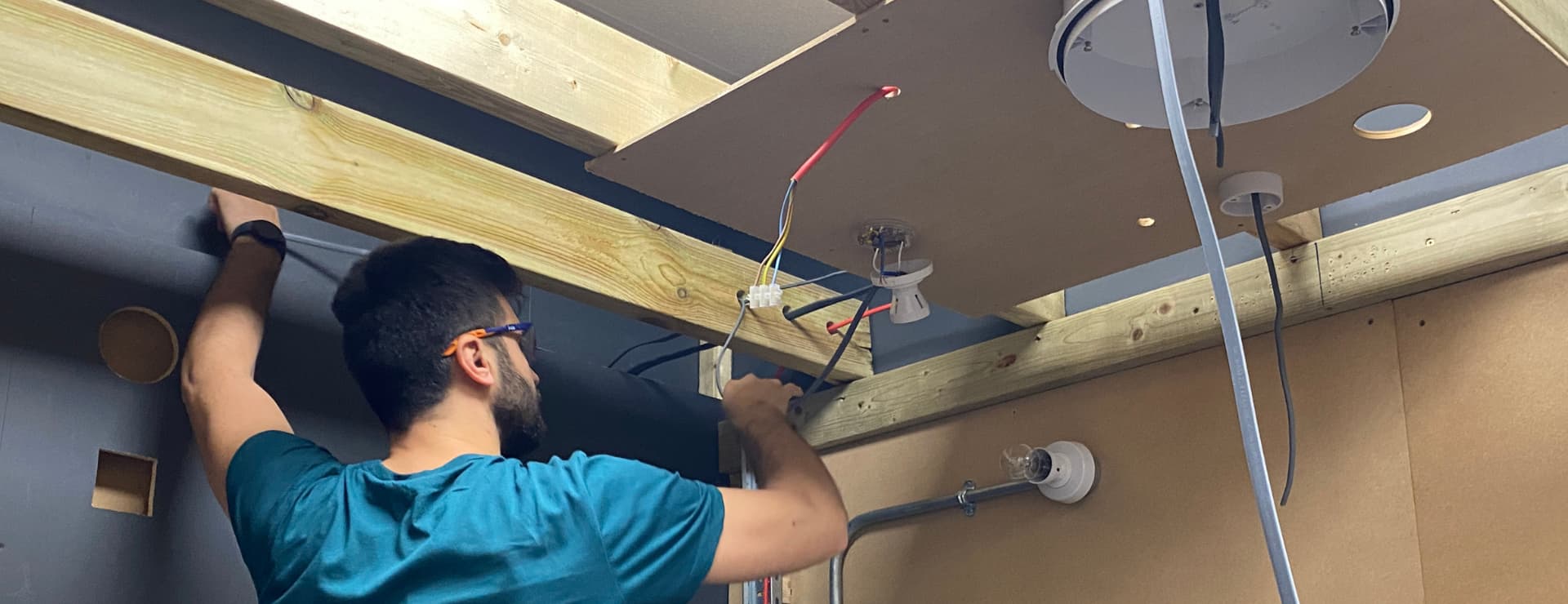So, you’re eyeing up your old fuse box and wondering if your home’s electrics are more ‘vintage chic’ than ‘safe and sound’? You’re not alone. Rewiring a house is one of those big-ticket home improvement jobs that can feel daunting, but it’s absolutely essential for safety, compliance, and future-proofing your property. If you want the full lowdown on the cost to rewire a house, with all the numbers, insider tips, and answers to those burning questions.
Why Rewire Your House? (And How to Spot the Signs)
Before we get into pounds and pence, let’s talk about why you might need a rewire in the first place. Old wiring isn’t just a quirk. It’s a risk. Outdated or damaged electrical systems can lead to blown fuses, tripped circuits, or, worst case, electrical fires. If your home is over 30 years old and hasn’t seen an electrical upgrade, or if you’re noticing flickering lights, buzzing sockets, or the smell of burning plastic, it’s time to act.
Key signs your house might need rewiring
- Frequent blown fuses or tripped breakers
- Outdated fuse box (not a modern consumer unit)
- Sockets or switches that feel warm or look scorched
- Rubber, fabric, or lead-insulated wiring
- Flickering or dimming lights
The Cost to Rewire a House: UK Averages
Let’s cut to the chase. How much does it cost to rewire a house in the UK in 2025? Here’s what you need to know:
| Property Type | Average Cost (plus VAT) | Typical Duration |
|---|---|---|
| 1-bed flat | £3,000 – £4,800 | 3–5 days |
| 2-bed flat/house | £3,500 – £5,800 | 3–5 days |
| 3-bed house | £4,450 – £8,000 | 5–7 days |
| 4-bed house | £6,080 – £9,380 | 7–10 days |
| 5-bed house | £7,500 – £12,500 | 10–14 days |
Note: These are ballpark figures based upon multiple sources: Electrician Day Rates in the UK, Checkatrade, MyBuilder and Houserewire. The final price can swing up or down depending on your location, property age, and the complexity of the job.
What’s Included in a Full House Rewire?
A proper rewire isn’t just a quick swap of a few wires. Here’s what you’re actually paying for:
- Removal of old wiring and fittings
- Installation of new wiring throughout the property
- New sockets, switches, and standard white finish electrical accessories
- New metal consumer unit (fuse box)
- Circuit testing and certification (EICR)
- Minor plastering to fill holes
What’s usually NOT included:
- Major plastering or decorating
- New flooring or carpets
- Premium sockets, switches, or smart home tech (these add to the cost)
Factors That Affect the Cost to Rewire a House
When it comes to the cost to rewire a house, there’s no one-size-fits-all answer. The final figure on your invoice is shaped by a mix of property features, technical challenges, and your own preferences. Here’s a deep dive into the key factors that can influence your rewiring bill:
Property Size and Layout
When it comes to rewiring a property, the bigger your home, the more cable, sockets, switches, and labour are required. A one-bedroom flat is a much smaller job than a sprawling five-bed detached house, so expect the cost to scale up accordingly. Not only this, but the layout complexity will also affect the job’s cost. Multi-storey homes, properties with extensions, or unusual architectural quirks (think split levels, loft conversions, or basements) mean more time and effort for electricians to route cables and access all areas.
Age and Condition of the Property
Older wiring = more work. Properties built before the 1970s often have outdated, unsafe wiring that needs full replacement. Sometimes, you’ll find rubber or fabric-insulated cables, old fuse boxes, or even hidden junction boxes, all of which take extra time to remove and upgrade. Additionally, older homes can spring surprises like damaged insulation, bodged DIY jobs, or even asbestos, which can slow down the process and add to costs.
Occupied vs. Unoccupied
Empty is easier. Rewiring an unoccupied property is quicker and less disruptive. Electricians can move freely, lift carpets, and chase walls without working around furniture or your daily routine. If you’re living in during the rewire, expect the job to take longer and potentially cost more due to the extra care and time needed.
Quality and Type of Fittings
The quality and type of fittings you choose will also affect your budget. Standard white plastic sockets and switches are the most economical option, but if you prefer premium finishes such as brushed steel, brass, or smart home accessories, you should be prepared to pay extra for both the materials and their installation. Similarly, opting for designer lighting, dimmer switches, or integrated LED systems can further increase your expenditure.
Location and Regional Labour Rates
Your location within the UK is another key factor, as labour rates vary significantly from region to region. For example, rewiring a house in London or the South East is generally more expensive than in the North or rural areas, due to higher demand and increased living costs. Additionally, some regions may have stricter building control requirements, which can add to both the cost and the administrative workload.
Accessibility
Accessibility within your property can either streamline or complicate the rewiring process. Homes where wiring is easily accessible, such as those with exposed beams or a loft space, allow electricians to work more efficiently, reducing both time and labour costs. In contrast, properties with thick stone walls, built-in cabinetry, or awkward crawl spaces require more effort, which can increase the overall cost. The extent of any necessary plastering or decorating after the rewire will also influence your final bill.
Extent of Rewiring and Additional Upgrades
The scope of the rewiring project itself is another consideration. A full rewire covering the entire property will naturally cost more than a partial rewire focused on specific rooms or circuits. If you’re planning to add extra circuits for things like electric showers, underfloor heating, garden lighting, or security systems, these upgrades will increase your costs but can add significant value and convenience to your home. Many homeowners also take the opportunity to future-proof their properties by adding extra sockets, data cabling, or smart home infrastructure during a rewire, which can be more cost-effective in the long run.
Complexity of the Project
Finally, the complexity of your project and any custom requirements will play a role. Homes with advanced needs, such as integrated smart home systems, multiple consumer units, or sophisticated lighting and sound systems, require specialist skills and more time, which will be reflected in your quote. The type of property can also make a difference; for example, mid-terrace houses may present access challenges compared to detached properties.
Key Takeaways
- Get a detailed quote: Always ask for a fully itemised quote so you know exactly what’s included—materials, labour, certification, and making good.
- Plan for contingencies: Build in a buffer for unexpected issues, especially in older homes.
- Bundle jobs: If you’re planning other renovations, combine them with your rewire to save on labour and disruption.
In summary, the cost to rewire a house is shaped by a combination of property size, age, accessibility, your choice of fittings, location, and any additional upgrades you choose. Understanding these factors will help you budget accurately and avoid surprises when the bill arrives.
For more tips on preparing for a rewire and getting the best value, get quotes from multiple electricians and check out our article on Electrician’s Day Rates in the UK to see how they compare.

How to Save Money on Your House Rewire
We all love a bargain, but don’t scrimp on safety. Here’s how to keep costs sensible without cutting corners:
- Get multiple quotes: Always compare at least three quotes from NICEIC or NAPIT-registered electricians. Don’t just accept the first quote you get. See what the going price is in your area before committing.
- Clear rooms in advance: Electricians work faster if they’re not dodging your furniture. If you’ve done any DIY or cleaning, you know that stuff always gets in the way. Save time and money by clearing the areas that the electricians will be working in.
- Bundle jobs: Combine your rewire with other electrical jobs (like a new consumer unit or extra sockets). Just like with any business, the more you spend, the bigger the savings. Tradespeople are no different. Considering rewiring jobs are cheap, you might be able to get other services for a cheaper cost. There’s no harm in asking!
- Opt for energy-efficient fittings and fixtures: While some of the newer, more efficient products, like LED lights, have a higher upfront cost, they’ll save you money in the long run.
- Consider timing: If you can move out during the work, it’ll be quicker and potentially cheaper.
The Rewiring Process: What to Expect
A full rewire is a big job, but knowing what’s coming helps you plan:
- Preparation: Move furniture, lift carpets, and clear access to sockets and switches.
- First fix: Old wiring is removed, and new cables are installed (often involves chasing into walls and ceilings).
- Second fix: New sockets, switches, and the consumer unit are fitted.
- Testing and certification: The whole system is tested and certified to current standards (you’ll get an EICR).
- Making good: Minor plastering to patch up chases and holes.
Top tip: Expect dust. Lots of it. If you’re living in during the rewire, invest in dust sheets and patience.
The Legal Bit: Certification and Compliance
After a house rewire, certification and compliance are not just formalities—they are legal requirements that protect you, your property, and future buyers. The most important document you’ll receive is the Electrical Installation Certificate (EIC), which must be issued by a qualified electrician. This certificate confirms that all new electrical work complies with the current British Standards (BS 7671) and has been installed, inspected, and tested according to the latest safety regulations.
The EIC is essential for all “notifiable” work, which includes a full or partial rewire, installation of new circuits, or replacement of the consumer unit (fuse box). It is your proof that the work meets the rigorous standards set out in Part P of the Building Regulations. Without this certificate, you could face significant problems if you ever want to sell your property, as solicitors and buyers will request evidence that your electrics are safe and compliant.
In addition to the EIC, your electrician (if registered with a competent person scheme such as NICEIC or NAPIT) will notify your local authority’s building control on your behalf. This notification is a legal requirement for notifiable work and ensures that the local authority is aware the electrical installation meets all safety and compliance standards. If your electrician is not registered, you must inform building control yourself, and the work will be subject to inspections throughout the process.
It is a criminal offence to carry out notifiable electrical work without proper certification or notification. Local authorities have the power to demand that non-compliant work be removed or altered, which can be costly and disruptive. For homeowners and landlords, keeping the EIC and any compliance certificates safe is crucial, not only for legal protection but also for insurance purposes and future property transactions.
To sum up: after your rewire, ensure you receive an EIC from your electrician, and check that your local authority has been notified if the work is notifiable. This paperwork is your assurance that your home is safe, legal, and ready for future sale or remortgage. Always use a registered, competent electrician for peace of mind and full compliance.
Extra Upgrades: What Else Can You Add?
While you’re having your house rewired, it’s the perfect time to future-proof your home:
- Smart home tech: Smart switches, sockets, and lighting
- EV charging points: For electric vehicles
- Outdoor lighting and security systems
- USB sockets: For charging devices
- CCTV and alarm systems
Each of these extras will add to your bill, but it’s far cheaper to install them during a rewire than as a separate job later.
If you’re an electrician reading this and EV chargers interest you, why not become a qualified EV chargepoint installer?
How to Choose the Right Electrician
Don’t just go with the cheapest quote. Look for:
- NICEIC or NAPIT registration
- Experience with partial and full house rewires
- Clear, itemised quotes
- Good reviews and references
- Willingness to provide certification
Final Thoughts
Rewiring your house is undeniably a significant investment, but it’s one that delivers real, long-lasting value, far beyond just ticking the safety box. First and foremost, a full rewire dramatically improves the safety of your home, reducing the risk of electrical fires, shocks, and power outages that can be caused by outdated or faulty wiring. This peace of mind is priceless, especially if you’re living in an older property or planning to stay put for years to come.
But the benefits don’t stop at safety. A modern electrical system can also make your home more energy-efficient, potentially lowering your electricity bills by allowing for the installation of the latest energy-saving technologies. You’ll also have the chance to add more sockets and strategically placed outlets, banishing the need for unsightly extension leads and making your home far more functional for modern living.
There’s also a clear financial upside. Updated wiring is a major selling point for buyers, often increasing the value of your property and making it much more attractive on the market. A home with a recent rewire and all the necessary certificates is a home that’s ready to sell, with no hidden electrical issues for the next owner to worry about.
Rewiring is also your opportunity to future-proof your home. With technology evolving rapidly, a new electrical system can support everything from smart lighting and EV chargers to home automation, security systems, and solar panels. By installing extra wiring or conduits now, you’ll save yourself the hassle and expense of disruptive upgrades later.
Of course, getting the best results means choosing the right electrician. Don’t just go for the cheapest quote. Look for someone with the right qualifications, a solid track record, and glowing reviews. Ask for detailed quotes, check for proper certification, and make sure they’re happy to answer your questions and explain the process clearly. A reputable electrician will not only deliver quality work but also provide you with the certification you need for peace of mind and future property sales.
Finally, don’t forget those little extras that can make your home smarter and more efficient, such as USB sockets, smart switches, or extra circuits for future tech. These upgrades are far easier and more affordable to install during a rewire than as separate projects down the line.
If you want more expert advice, practical tips, or you’re considering a career in the electrical industry, keep exploring our articles and our Electrical Courses. We’re here to help you make informed decisions, whether you’re upgrading your home or upskilling for your future.
FAQs
How often should a house be rewired in the UK?
Generally, a full rewire is recommended every 25–30 years, or sooner if the wiring is showing signs of age or damage.
Can I rewire my house room by room?
Technically, yes, but it’s less efficient and may cost more in the long run. A full rewire is usually more cost-effective and ensures the whole system is up to standard.
Is rewiring covered by home insurance?
Usually not, unless it’s required after an insured event (like fire or flood). Always check your policy.
Will rewiring add value to my home?
Absolutely. A modern, certified electrical system is a major selling point and can boost your property’s value and appeal.
Do I need planning permission to rewire my house?
No, but all work must comply with Part P of the Building Regulations, and you’ll need certification from a qualified electrician.
Will my location affect the cost of a partial or full house rewire?
Short answer: yes. Labour costs in London and the South East are typically higher than in the North or Midlands. For example, a three-bed house rewire might cost £4,500 in Manchester but £6,500 in London. Always get local quotes for the most accurate pricing.
Do I need to move out during a rewire?
If you can, yes, as it’s a lot easier for everyone. But if that’s not possible, you’ll need to coordinate with your electrician to keep some power running and minimise disruption. Be prepared for a few days of mess, noise, and limited access to rooms.










